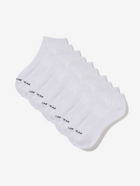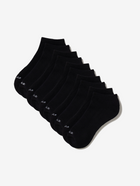In an industry known for its fleeting trends, we're here to show you a different path—one where sustainability, ethics, and the enduring charm of natural fabrics take center stage.
In this article, we'll uncover the issues with synthetic fabrics, celebrate the merits of natural materials, and shed light on how Allwear is leading the charge toward a greener, more responsible future in fashion.
The Synthetic Fiber Problem
The proliferation of synthetic fibers in the fashion industry
The fashion industry has seen a seismic shift towards synthetic fibers over the past few decades. Materials such as polyester, nylon, and acrylic have become ubiquitous, largely due to their low production costs and their ability in creating a wide range of clothing items.
Fast fashion's obsession with rapid turnover has further fueled the demand for these synthetic materials, leading to their extensive use in the garments we find on store shelves today.
The environmental and health concerns associated with synthetic fabrics
Synthetic fibers might seem convenient, but their hidden costs are alarming. The production of synthetic textiles relies heavily on petrochemicals, contributing to significant greenhouse gas emissions.
Furthermore, the toxic chemicals used in the dyeing and finishing processes of synthetic fabrics not only pollute waterways but also pose health risks to both workers and consumers.
How microplastics from synthetic clothing are polluting our planet
One of the gravest concerns related to synthetic fibers is their role in the microplastic pollution crisis. When synthetic garments are washed, they shed tiny plastic particles known as microplastics.
These minuscule fragments find their way into rivers and oceans, infiltrating aquatic ecosystems and posing a severe threat to marine life. The widespread prevalence of microplastics, often invisible to the naked eye, has raised concerns about their potential impact on human health as well, as they can enter our food chain through seafood consumption.
The Natural Alternative
Natural fabrics
Natural fabrics are textiles derived from organic sources, including plants and animals, and undergo minimal processing to preserve their inherent qualities.
Examples of natural fabrics encompass a diverse range, from organic cotton, grown without synthetic pesticides or genetically modified organisms, to hemp, known for its durability and minimal environmental impact.
Bamboo, another remarkable choice, is celebrated for its rapid growth and sustainability.
The benefits of natural fabrics for sustainability and comfort
Natural fabrics are inherently biodegradable, meaning they can naturally decompose over time, returning to the earth without releasing harmful chemicals or microplastics. This property significantly reduces the environmental burden of textile waste. Additionally, the cultivation of many natural fibers requires fewer resources, such as water and energy, compared to their synthetic counterparts.
Natural fabrics offer superior comfort due to their breathability and moisture-wicking properties. They allow the skin to breathe, preventing discomfort and skin irritations. Whether you're navigating a warm summer day or a chilly winter evening, natural fabrics adapt to your body's needs, providing unparalleled comfort.
The versatility and timeless appeal of natural fabrics in fashion
Natural fabrics are celebrated for their timeless appeal and versatility in the world of fashion. They seamlessly blend fashion and sustainability, making them ideal for a wide range of clothing items.
From organic cotton T-shirts that exude casual elegance to the graceful drape of linen dresses, natural fabrics offer style without compromising on ethical and ecological considerations.
Their ability to transcend seasonal trends ensures that garments made from these materials remain enduring staples in any wardrobe, fostering a sense of authenticity and longevity in an industry often characterized by fleeting fads.
Allwear’s Unwavering Commitment to Using Natural Fabrics
At Allwear, our commitment to sustainability begins with our unwavering dedication to natural fabrics. We recognize the pivotal role these materials play in creating fashion that not only looks good but does good for the planet. Our journey toward a greener future is firmly rooted in our choice to say 'no' to harmful synthetic fibers and embrace the power of natural fabrics.
We take meticulous care in sourcing the finest natural materials for our clothing collections. Our commitment to eco-consciousness extends to every step of our supply chain, from selecting reputable suppliers who adhere to sustainable practices to ensuring that our production processes minimize environmental impact.
We believe in full transparency, allowing our customers to trace the journey of their garments back to the source, giving them confidence in the ethical and sustainable origins of their clothing.
In our quest for sustainability, we actively seek certifications and partnerships that align with our values. Allwear proudly collaborates with organizations and initiatives that promote ethical and environmentally responsible practices in the textile industry.
Our certifications serve as a testament to our commitment to using natural fabrics and producing clothing that respects both people and the planet.
By choosing Allwear, our customers join us in supporting a fashion industry that prioritizes natural fabrics, ethical production, and sustainable choices. Together, we are paving the way for a fashion future that harmonizes style and environmental stewardship, proving that fashion can be a force for positive change.
Quality Over Quantity
Our philosophy at Allwear is rooted in the belief that quality should always take precedence over quantity. Garments made from natural fabrics inherently possess a durability and longevity that sets them apart.
Unlike the disposable nature of fast fashion, clothing crafted from materials like organic cotton, hemp, and linen is designed to withstand the test of time.
These natural fabrics are not only resistant to pilling and durable but also become softer and more comfortable with each wear, ensuring that your clothing investment continues to pay dividends over the years.
At Allwear, we go beyond just offering quality materials; we prioritize timeless design. Our clothing is meticulously crafted to be more than just a passing trend. We believe that fashion should be an investment in pieces that not only look good today but remain relevant and stylish for years to come.
Our design approach is rooted in classic aesthetics that transcend seasonal fluctuations, ensuring that our clothing remains enduring and versatile.
By selecting pieces from Allwear, you are not merely buying into a fashion statement; they are investing in a sustainable wardrobe that exudes timeless elegance and longevity.
Allwear's Sustainable Fashion Options
At Allwear, sustainability isn't just a buzzword; it's the core of our brand identity. Our commitment to a greener future is reflected in every product we create, combining style with eco-consciousness.
Here's a closer look at some of our sustainable fashion options, each designed to promote a more sustainable lifestyle:
Organic Cotton Essentials
Our range of organic cotton essentials, including crew neck tees and sweatshirts, embodies sustainability at its core. Grown without synthetic pesticides or GMOs, organic cotton promotes healthier ecosystems and reduces chemical exposure.
Tencel Luxury
Our Tencel hybrid bomber jackets epitomize luxury and eco-consciousness. Derived from sustainably sourced wood pulp, Tencel not only offers a smooth texture but also embraces a closed-loop production process, minimizing waste and environmental impact.
Bamboo Bliss
Experience the comfort and antibacterial + thermo-regulating properties of bamboo with our bamboo bra tops, leggings, and compression shorts. Bamboo's fast growth and minimal water requirements make it a top choice for eco-friendly fashion.
Building a Sustainable Wardrobe
Creating a sustainable wardrobe is not only an investment in your personal style but also a powerful statement of your commitment to a greener world.
Here are some practical steps and tips to guide you in building a sustainable wardrobe:
Assess Your Current Wardrobe
Start by taking a close look at your existing clothing collection. Identify items that you truly love, wear frequently, and align with your style and values. These pieces will form the foundation of your sustainable wardrobe.
Choose Timeless Styles
Embrace classic, timeless styles that transcend seasonal trends. These enduring pieces remain fashionable year after year, reducing the need for frequent wardrobe updates. Look for versatile items like well-fitted jeans, white shirts, and neutral-toned dresses.
Prioritize Quality Over Quantity
Invest in high-quality clothing made from sustainable materials like organic cotton, hemp, and bamboo. These materials not only last longer but also offer superior comfort and breathability. Fewer, better-quality pieces will serve you well over the long term.
Mix and Match
Opt for clothing items that can be easily mixed and matched to create various outfits. This versatility allows you to maximize the use of each piece in your wardrobe, reducing the need for excess clothing.
Capsule Wardrobe Approach
Consider adopting a capsule wardrobe approach, where you curate a small collection of essential, versatile items that can be worn interchangeably. This minimalist approach not only simplifies your fashion choices but also reduces consumption and waste.
Conclusion
In a world where fashion choices are often fleeting and disposable, Allwear stands as a beacon of change, advocating for a greener, more sustainable fashion future.
Building a sustainable wardrobe is a powerful step towards a more responsible and stylish world. It's about making mindful choices, cherishing quality over quantity, and supporting brands like Allwear that prioritize sustainability and timeless design.



